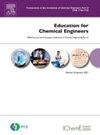15 years of IChemE-accredited degrees at the University of Santiago de Compostela: A description of the motivation, journey, and output
IF 2.3
2区 教育学
Q1 EDUCATION, SCIENTIFIC DISCIPLINES
引用次数: 0
Abstract
The accrediting scheme by the Institution of Chemical Engineers (IChemE) constitutes an international reference for the specific accreditation of chemical engineering programmes in higher education. The promoters of the initial 5-year chemical engineering programme at the University of Santiago de Compostela (USC) identified such scheme as a very attractive value for the continuous improvement of the programme as well as concomitantly for the skills set and employability of its graduates, getting accredited for the first time in 2010 (and renewed in 2013). In adapting this 5-year programme to a sequence of bachelor + master programmes under the Bologna process in the early 2010s, the design of the new programmes was carefully performed to balance adequately the requirements of a considerably regulated framework for the studies of chemical engineering at the Spanish legislative level and the requirements more connected with the chemical engineer profession emphasised by the IChemE accrediting guidelines. The IChemE accreditation has been successfully achieved (2018) and renewed (2024) by both the Bachelor’s Degree in Chemical Engineering and the Master’s Degree in Chemical Engineering and Bioprocesses at USC, and it has acted not just as a seal of added value but also as a key driving force in keeping the continuous improvement wheel turning. This has been particularly manifested in aspects such as the introduction in the programmes of new content aligned with the new worldwide trends in the field of chemical engineering, and the growing importance given to embedded cultural learning associated with e.g. ethics, sustainability, health and safety, or diversity.
圣地亚哥德孔波斯特拉大学15年icheme认证学位:动机、历程和产出的描述
化学工程师学会(IChemE)的认证计划是高等教育化学工程课程具体认证的国际参考。圣地亚哥德孔波斯特拉大学(USC)最初的5年化学工程项目的推动者认为,该项目对项目的持续改进以及毕业生的技能和就业能力具有非常有吸引力的价值,该项目于2010年首次获得认证(并于2013年更新)。为了适应2010年代初博洛尼亚进程下的一系列学士+硕士课程,新课程的设计经过仔细执行,以充分平衡西班牙立法层面对化学工程研究的严格监管框架的要求,以及与IChemE认证指南强调的化学工程师专业更相关的要求。南加州大学化学工程学士学位和化学工程与生物过程硕士学位都成功获得了IChemE认证(2018年)和更新(2024年),它不仅是附加值的标志,也是保持持续改进的关键驱动力。这一点在以下方面表现得尤为突出:在方案中引入符合化学工程领域新的全球趋势的新内容,以及日益重视与伦理、可持续性、健康和安全或多样性等相关的嵌入式文化学习。
本文章由计算机程序翻译,如有差异,请以英文原文为准。
求助全文
约1分钟内获得全文
求助全文
来源期刊

Education for Chemical Engineers
Multiple-
CiteScore
8.80
自引率
17.90%
发文量
30
审稿时长
31 days
期刊介绍:
Education for Chemical Engineers was launched in 2006 with a remit to publisheducation research papers, resource reviews and teaching and learning notes. ECE is targeted at chemical engineering academics and educators, discussing the ongoingchanges and development in chemical engineering education. This international title publishes papers from around the world, creating a global network of chemical engineering academics. Papers demonstrating how educational research results can be applied to chemical engineering education are particularly welcome, as are the accounts of research work that brings new perspectives to established principles, highlighting unsolved problems or indicating direction for future research relevant to chemical engineering education. Core topic areas: -Assessment- Accreditation- Curriculum development and transformation- Design- Diversity- Distance education-- E-learning Entrepreneurship programs- Industry-academic linkages- Benchmarking- Lifelong learning- Multidisciplinary programs- Outreach from kindergarten to high school programs- Student recruitment and retention and transition programs- New technology- Problem-based learning- Social responsibility and professionalism- Teamwork- Web-based learning
 求助内容:
求助内容: 应助结果提醒方式:
应助结果提醒方式:


